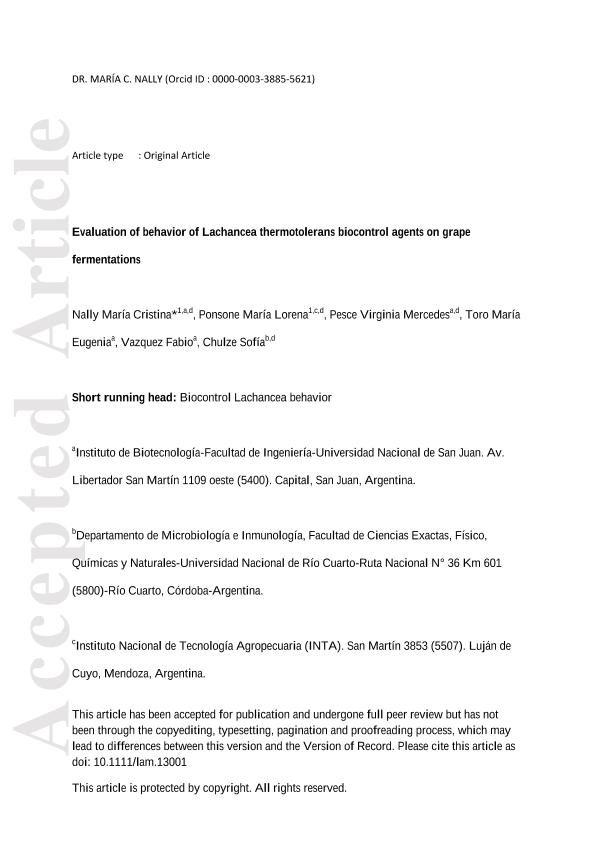Mostrar el registro sencillo del ítem
dc.contributor.author
Nally, Maria Cristina

dc.contributor.author
Ponsone, Maria Lorena

dc.contributor.author
Pesce, Virginia Mercedes

dc.contributor.author
Toro, Maria Eugenia

dc.contributor.author
Vazquez, Fabio

dc.contributor.author
Chulze, Sofia Noemi

dc.date.available
2020-01-30T22:13:59Z
dc.date.issued
2018-07
dc.identifier.citation
Nally, Maria Cristina; Ponsone, Maria Lorena; Pesce, Virginia Mercedes; Toro, Maria Eugenia; Vazquez, Fabio; et al.; Evaluation of behaviour of Lachancea thermotolerans biocontrol agents on grape fermentations; Wiley Blackwell Publishing, Inc; Letters in Applied Microbiology; 67; 1; 7-2018; 89-96
dc.identifier.issn
0266-8254
dc.identifier.uri
http://hdl.handle.net/11336/96333
dc.description.abstract
Previous researches have showed that Lachancea thermotolerans strains RCKT4 and RCKT5 inhibited the growth of Aspergillus. However, currently, there are no data on their nutritional preferences, as a possible substrate competitor against Saccharomyces cerevisiae, and their effects on fermentation. In this work, we observed that the biocontrol yeasts and S. cerevisiae BSc203, based on the utilization of 16 carbonate sources, revealed significant differences in the nutritional profile (biocontrol yeasts NS:0·25, BSc203 NS:0·56). Lachancea thermotolerans strains did not occupy the same niche as that of BSc203 (NOI:0·44). The biocontrol agents and BSc203 presented similar competitive attitude in terms of the sugar, ethanol and sulphite tolerances. During fermentation, the biocontrol yeasts were found to tolerate up to 12% v/v ethanol, 250 mg ml−1 of total SO2 and 30° Brix sugar. In mixed cultures, L. thermotolerans strains did not negatively affect the growth of BSc203 and the wine quality, except when RCKT4 was initially inoculated at a high proportion in the mixed culture 1MSK4 (1%BSc203/99%RCKT4), resulting in a lower production of CO2 and ethanol, in comparison with pure BSc203. RCKT5, at a high proportion, in 1MSK5 (1%BSc203/99%RCKT5) presented promising oenological properties. This fermentation showed lower acetic acid contents and higher total acidity than pure BSc203. Significance and Impact of the Study: Generally it is not evaluated if the biofungicide yeasts sprayed on vegetables alter the quality of the fermented products. This work focused on the importance of assessing the possible effects of yeast-based fungicides used in vineyards on grape fermentation, especially on Saccharomyces cerevisiae growth. In this context, the competition between biofungicide yeasts and S. cerevisiae under winemaking conditions is investigated.
dc.format
application/pdf
dc.language.iso
eng
dc.publisher
Wiley Blackwell Publishing, Inc

dc.rights
info:eu-repo/semantics/openAccess
dc.rights.uri
https://creativecommons.org/licenses/by-nc-sa/2.5/ar/
dc.subject
BEHAVIOUR
dc.subject
BIOCONTROL
dc.subject
FERMENTATION
dc.subject
LACHANCEA THERMOTOLERANS
dc.subject
SACCHAROMYCES CEREVISIAE
dc.subject
SUBSTRATE COMPETITION
dc.subject.classification
Micología

dc.subject.classification
Ciencias Biológicas

dc.subject.classification
CIENCIAS NATURALES Y EXACTAS

dc.title
Evaluation of behaviour of Lachancea thermotolerans biocontrol agents on grape fermentations
dc.type
info:eu-repo/semantics/article
dc.type
info:ar-repo/semantics/artículo
dc.type
info:eu-repo/semantics/publishedVersion
dc.date.updated
2020-01-29T22:34:31Z
dc.journal.volume
67
dc.journal.number
1
dc.journal.pagination
89-96
dc.journal.pais
Reino Unido

dc.journal.ciudad
Londres
dc.description.fil
Fil: Nally, Maria Cristina. Consejo Nacional de Investigaciones Científicas y Técnicas; Argentina. Universidad Nacional de San Juan. Facultad de Ingeniería. Instituto de Biotecnología; Argentina
dc.description.fil
Fil: Ponsone, Maria Lorena. Instituto Nacional de Tecnología Agropecuaria; Argentina. Consejo Nacional de Investigaciones Científicas y Técnicas; Argentina
dc.description.fil
Fil: Pesce, Virginia Mercedes. Consejo Nacional de Investigaciones Científicas y Técnicas; Argentina. Universidad Nacional de San Juan. Facultad de Ingeniería. Instituto de Biotecnología; Argentina
dc.description.fil
Fil: Toro, Maria Eugenia. Universidad Nacional de San Juan. Facultad de Ingeniería. Instituto de Biotecnología; Argentina. Consejo Nacional de Investigaciones Científicas y Técnicas; Argentina
dc.description.fil
Fil: Vazquez, Fabio. Universidad Nacional de San Juan. Facultad de Ingeniería. Instituto de Biotecnología; Argentina. Consejo Nacional de Investigaciones Científicas y Técnicas; Argentina
dc.description.fil
Fil: Chulze, Sofia Noemi. Universidad Nacional de Río Cuarto. Facultad de Ciencias Exactas, Fisicoquímicas y Naturales. Departamento de Microbiología e Inmunología; Argentina. Consejo Nacional de Investigaciones Científicas y Técnicas; Argentina
dc.journal.title
Letters in Applied Microbiology

dc.relation.alternativeid
info:eu-repo/semantics/altIdentifier/doi/http://dx.doi.org/10.1111/lam.13001
dc.relation.alternativeid
info:eu-repo/semantics/altIdentifier/url/https://sfamjournals.onlinelibrary.wiley.com/doi/abs/10.1111/lam.13001
Archivos asociados
